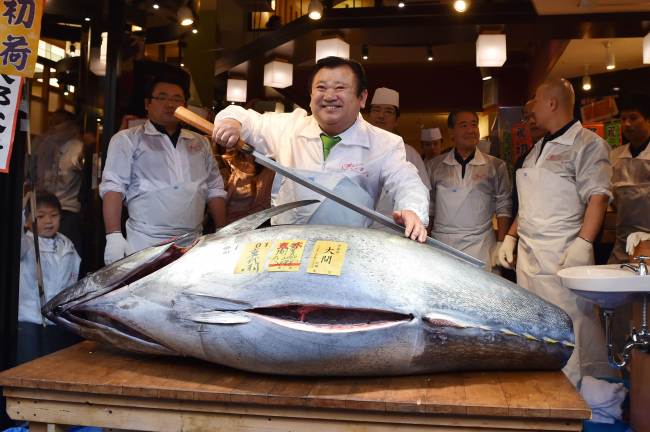TOKYO (AFP) - Kiyoshi Kimura‘s ear-to-ear grin is tough to miss in Japan -- it’s splashed across ubiquitous billboards advertising his nationwide sushi chain.
But the self-styled “Tuna King” isn't smiling about plans to move Tokyo’s famous Tsukiji market, the world's biggest fish emporium, and warns that its unique identity is at risk of being destroyed.
Kimura’s office is a block away from the historic site where in 2013 he famously slapped down a record $1.8 million bid at the traditional New Year bluefin tuna auction.
But this month's sale -- where Kimura prevailed again with a comparatively modest $117,000 bid for an enormous 200-kilogram tuna -- will mark his last victory at the chaotic market, popular with locals and tourists alike.
 |
President of sushi restaurant chain Sushi-Zanmai, Kiyoshi Kimura (center) holds a long fish knife as he poses with a 200-kilogram bluefin tuna at his main restaurant near Tokyo‘s Tsukiji fish market on Jan. 5. (AFP-Yonhap) |
Backers of the controversial move, planned for November, say the sprawling, 80-year-old complex is tired and out-of-date with an ancient refrigeration system.
Like many critics, however, Kimura -- a former member of Japan’s military who swapped dreams of becoming a fighter pilot for a life in the fish business -- is not sold on the idea.
“It's a bit sad that Tsukiji is moving,” the 63-year-old told AFP at his office, which is covered with photos of top Japanese celebrities and politicians.
“For as long as I have been in the fish business, Tsukiji was here,” Kimura added, saying that it is hard to see the move in a positive light.
Kimura abandoned plans to help build a leisure facility at the new site, which was set to feature a 1,000-seat food court, about 140 restaurants and retailers, as well as Tokyo’s biggest hot spring, known as an onsen.
The four-decade fish veteran is not even sure he‘ll build one of his own Sushizanmai restaurants at the decidedly less charming new facility built on reclaimed land in Tokyo Bay.
“It’s still unclear how the outer market is going to be built,” he said of the new location.
“A fish market is a place where people like to gather. But if there is no sense of excitement, people won‘t come.”
’A bit expensive'
For Kimura, there are few things more exciting than serving up sushi, particularly purple slabs of tuna on rice.
Sushizanmai’s advertisements star a beaming Kimura, his stout frame squeezed into a fish smock and rubber booties, standing over the monster specimens.
And he seems happy as a clam to pay way over the odds for the prestige of buying the first fish of the year.
“I won‘t make a profit off that tuna,” Kimura said of his recent winning bid.
“The New Year’s sales are a little bit expensive, but after that prices will return to normal levels.”
Bluefin is usually the priciest fish available at Tsukiji and a single piece of “otoro,” or the fish‘s fatty underbelly, can cost up to several thousand yen (over $25) at high-end Tokyo restaurants.
Kimura disputes suggestions that his eye-popping offers -- including the record 2013 purchase sparked by a bidding war with a Hong Kong chain -- are just a publicity stunt.
“My business is about giving customers delicious and high quality produce,” he insisted.
“To really have that feeling -- and to make customers happy -- is the best thing that could happen. If you’re doing it just for marketing, I don‘t think you can pass that feeling on to customers.”
In fact, he said paying top yen for tuna helps keep prices up, and protect the species.
Environmentalists warn that bluefin tuna could be on its way to extinction -- Japan is the world’s biggest consumer of the fish and has faced calls to rein in catches.
In 2014, sushi maestro Jiro Ono, whose creations have been enjoyed by U.S. President Barack Obama and are reputedly the best in the world, said overfishing was a red flag for the industry.
But Kimura is convinced tuna will always reign supreme in the sushi world.
“Stocks of saba (mackerel) and aji (horse mackerel) have also been depleted from time to time, but then they always come back.”








